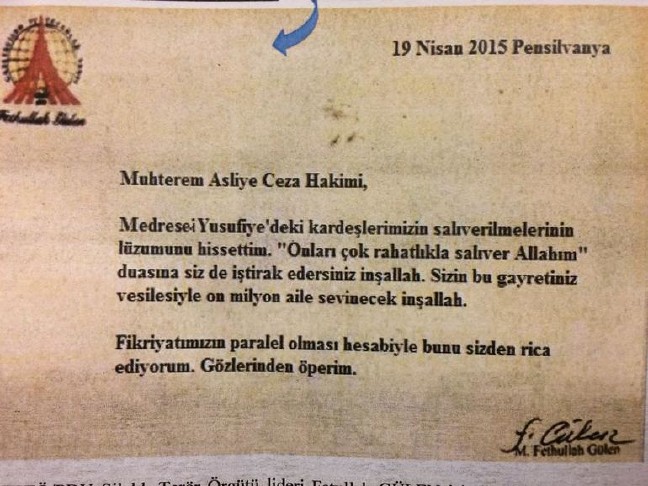Turkey submitted a forged letter attributed to Turkish cleric Fethullah Gülen to the European Court of Human Rights (ECtHR) suggesting that two judges made decisions at the behest of Gülen, a judgment by the Strasbourg court showed on Tuesday.
The ECtHR ruled in the case of Başer and Özçelik v. Türkiye that the pretrial detention of former judges Mustafa Başer and Metin Özçelik was unlawful and lacked reasonable suspicion that a crime had been committed, saying that Turkey must pay 5,000 euros in non-pecuniary damages to the applicants.
In April 2015 Başer and Özçelik unsuccessfully ruled for the release of 75 people, including Hidayet Karaca, the head of the now-closed opposition broadcaster Samanyolu TV, and police officers involved in a 2013 corruption investigation into relatives of cabinet members of then-prime minister and current president Recep Tayyip Erdoğan.
In 2017 the judges were each sentenced to 10 years in prison for abusing their judicial power and obeying Gülen’s orders to release the defendants. They had been imprisoned since May 2015 and were previously suspended from their posts by the Supreme Board of Judges and Prosecutors (HSYK).
After exhausting domestic remedies, Başer and Özçelik lodged an application with the ECtHR about their initial pretrial detention.
The ECtHR judgment finding their detention unlawful also states that the Turkish government “drew the Court’s attention to a document found on a USB stick seized during a search of a certain F.Y.’s home on 26, July 2016,” referring to Fevzi Yazıcı, the jailed art director of the now-closed-down Zaman daily who had been prosecuted for being a member of a movement inspired by the cleric Gülen.
The Turkish government accuses Gülen and his followers of orchestrating a failed coup in 2016 and labels the movement a terrorist organization. The movement denies any involvement in the coup and any terrorist activity.
“The document is a copy of a card in the name of Fetullah Gülen and signed by him, dated 19 April 2015 and written in Pennsylvania, in the United States,” the ECtHR said, giving a translation of the text as follows:
“Honourable Judge of the Criminal Court,
I feel the need to liberate … our brothers of the Medrese-i Yusufiye [in reference to the imprisonment of the Prophet Joseph, it means the place of detention of persons detained for their work for faith and the Koran]. Inshallah, you will also adhere to the prayer ‘My God, free them with ease’. Thanks to your effort, ten million families will rejoice, inshallah.
I ask you this because our ideas are parallel. I’m kissing you with my eyes.
Fetullah Gülen”
The letter presents Gülen as kindly and implicitly asking the judge to release the allegedly Gülen-linked suspects, the police officers and others, likening their case to that of the Prophet Joseph, who was unjustly jailed. Gülen also allegedly implies in the letter that he knows the judge is a follower of his movement and that is why he is making such a request of him.
In 2017 Yazıcı was threatened at police headquarters to admit he had a letter with him from Gülen, according to information obtained from family members. He did not admit to saving the letter on his USB stick or bringing it with him from the United States.
The letter, which was published 17 months after Yazıcı’s arrest, was also not mentioned in his indictment, in which he faced three life sentences for participating in a meeting about an ad in the Zaman daily a year before the 2016 coup. He and several other media employees were accused of sending “subliminal messages” to the military about a coup attempt through the ad.
İstanbul’s then-Chief Public Prosecutor İrfan Fidan presented the letter to reporters as “concrete evidence” of the judges’ alleged abuse of judicial power.
In his defense Yazıcı disputed the authenticity of the letter and said an expert report submitted to the court showed that the letter was forged and that Gülen’s signature was a copy of an earlier letter.
Quite scandal if true!
Turkish Government submits a wholly fabricated document in the recent case of Başer&Ozcelik and the @ECHR_CEDH acknowledges and refers to it but does not examine it because the issue at play is different.
Evidentiary regime at ECtHR? Laughing-stock 😂😂 https://t.co/5AY8H59Gn6 pic.twitter.com/RUuiiiJAqE
— Emre Turkut (@emreturkut) September 13, 2022
Gülen’s lawyers rejected the claims about the letter, calling it “complete nonsense, fabricated and invented” to make further false accusations against their client.
The TR724 news website claims that the letterhead and signature on the letter were copied from another of Gülen’s letters and that the letter contains many spelling and terminology errors as well as expressions not used by Gülen.
The letter was also presented to a New York federal court as evidence in the trial in which Mehmet Hakan Atilla, a senior executive at Turkey’s state-owned Halkbank, and seven others, including Turkey’s former economy minister and two other Halkbank executives, were charged with making hundreds of millions of dollars worth of transactions for the Iranian government and Iranian companies from 2010 to 2015 to evade US sanctions. Atilla’s lawyers sought to show that Gülen was in control of the judiciary and to dismiss the evidence that had previously been brought against him in Turkey. The court reportedly dismissed the letter as a piece of evidence.
Turkish government has attempted to manipulate the @ECHR_CEDH, a new low. They submitted a fabricated document in the case of detained judges. ECHR has also referred to this (false) evidence in its judgment (§ 184 and 199). https://t.co/bcMmVNk8sW
— Hakan Kaplankaya (@HKaplankaya) September 13, 2022
Legal adviser Hakan Kaplankaya told Turkish Minute that the ECtHR did not examine the letter as evidence because it surfaced much later than the ruling imprisoning Başer and Özçelik but said the episode should alarm the Strasbourg court about the credibility of Turkish claims in future judgments.
Source:Turkish Minute



